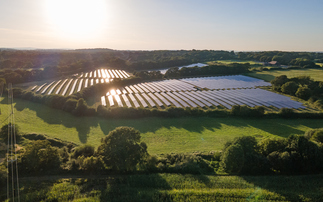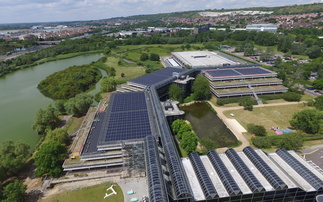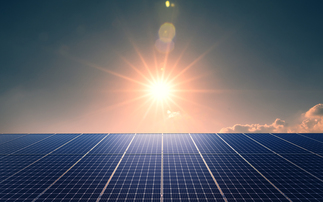Leonie Greene of the Solar Trade Association accuses the government of using solar as the fall guy for its clean energy budget woes
First wind and then solar. A government that created an energy efficiency shambles over its concern for rising energy bills has now attacked and destabilised the two cheapest and most popular renewables in the past week. We're in the thick of it in solar.
The solar industry, and my colleagues, could not have worked harder to deliver success. Call me old fashioned, but that means unprecedented cost cuts, clearly defined quality standards, unprecedented public support, the highest ratio of jobs, and the highest concentration of SMEs taking on the Big Six of any technology.
How many times was the industry told, that when we reached subsidy levels equivalent to 2 Renewable Obligation Certificates (ROCs), we would join the mainstream of renewables support? In reality the cheaper and more popular we get, the bigger the problem government seems to have with solar's success.
I know leaders in the solar industry and they are high calibre. These are shrewd business people with nerves of steel and the balls (or female equivalent) to take on the incumbent energy industry. Many of them care passionately about climate change. We've also been incredibly proud of their enthusiasm for using solar to boost British biodiversity.
But they are also human. And nobody likes to have exceptional performance met with a kicking.
They deserve the government's wholehearted backing. Yet over recent months the slurs from politicians, including 'immoral' and 'gold diggers', have been appalling. The industry is ethical and returns in solar are the lowest of all renewables.
Likewise I know the low cost of solar is down to staggering efficiencies achieved by the UK industry, achieved in record time. Solar modules are the minority of costs in solar installations of all size. If you want lowest cost solar, you need a highly efficient domestic industry. Someone should tell those in DECC who seem to think solar flies across the world's oceans and installs, operates and maintains itself.
DECC's Solar Strategy majors on bringing down the cost of solar. As I pointed out in my last BusinessGreen blog, if that's what they wanted to achieve the big missing element of their strategy was stability. How prophetic.
Anyone thinking 'oh it's not so bad' was probably not at the DECC solar industry meeting yesterday, nor can they have read the consultation documents very closely. Amazingly officials effectively explained that solar was the easiest target for balancing their overspent Levy Control Framework (LCF) books. And, we were even told in one meeting, if we were to really take off with under sub-5MW ROs we might well expect them to come after us again. The consultation also flags this prospect in black and white.
To treat the solar industry as some sort of pop-up side-show for balancing the LCF books, while other technologies enjoy at least a level of stability, beggars belief. If DECC cannot understand the problem with that as an approach, one despairs.
This is the technology the Intergovernmental Panel on Climate Change says has the greatest technical potential of all. This is the technology the US is driving below the cost of gas by 2020 to boost its international competitiveness. This is the technology that turns the grid on its head and empowers, quite literally, the people.
Having been told repeatedly that the Electricity Market Reform projections of 3.2GW of solar were merely indicative, DECC's latest volte face is to tell the industry this is now effectively a target and cause for curtailment.
We calculate that 3.2GW of solar consumes about seven per cent of the RO budget. Is DECC seriously saying that the second cheapest and most popular renewable technology deserves a mere fraction of resources? Let's hope that every politician who cares about delivering value for money for the consumer has something to say about that.
Of course there must be investment in offshore wind and emerging technologies like wave and tidal - that goes without saying. But there must be a sensible balance of solar, reflecting not only its popularity and cost-effectiveness, but its technical role in providing a more stable annual output across the grid, in complement with wind generation. Any country with a large renewable power sector knows the importance of engineering wind and solar together.
Again and again the industry has provided accurate data to DECC. Repeatedly we have advised when projections are wrong and provided up-to-date figures. STA's own expert Ray Noble has been made, at STA members' expense, freely available for independent advice on tap. DECC has had gathered around their Strategy Group the cream of the industry - all eager and available to help. They have been completely bypassed.
At no point did DECC officials approach us and ask for help with data and with thinking through what might be a sensible approach to legitimate concerns. The STA could not have been more transparent about industry costs - you can even see the projected breakdown of solar farm project costs online.
But in return for investment and the huge amounts of their time and money used to deliver the clean energy the UK needs, our members expect evidence-based policy-making. They expect to be treated on a level playing field with other technologies. And they expect government to understand that, for the industry to invest in jobs and bring costs down, they must provide a level of stability.
After all, the government is bending over backwards to provide stability to the French nuclear industry. It eulogises about opening up your local park and the strata beneath your home to the American fracking industry. It chases after Carbon Capture and Storage to prolong the life of fossil fuels despite the huge costs and major utilities giving up on the technology.
No wonder the British solar industry is incredulous.
Leonie Greene is head of external relations for the Solar Trade Association







